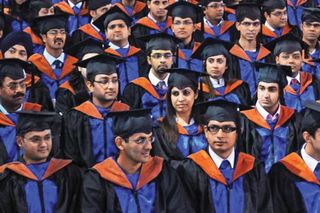
There Is No Such Thing as Achievement Through Pure Merit
Access to resources is what makes and breaks college admissions.

Legend has it that a good education is a brand one carries for life, in the best possible way. Tall tales of life in India’s top medical or engineering colleges populate social media and popular literature, drawing scores of readers and further confirming to them that a successful life is simply a few exams to crack. With limited seats, parental pressure and a never-ending stream of aspirants, students who cannot make it further feel unworthy and incompetent. They also often feel that they’d have made it if a percentage of seats in Government funded colleges were not reserved for marginalized castes and other minorities. Giving away seats to people due to their identity is the ‘death of merit’ to students who have to out-perfect each other in the general quota categories.
Pain and aggression as a response to failure are foreseeable. However, merit is not and will never be an inevitable result of hard work. This is because merit as we know it simply does not exist.
While merit will always require hard work to accomplish, it is often the result of work performed in an ideal environment. Merit is heavily related to an individual’s access to resources — both monetary and social — which are not uniformly distributed in society. If environments differ — and differ vastly — thenwhy is the standard to achieve ‘merit’ the same for all?
Related on The Swaddle:
The Importance of Inclusive Education for All Kids
Current and former students in India’s engineering and medical colleges who agreed to speak about their preparation days for this essay all indicated good coaching classes, mentorship and peer support, andstudy environments provided the extra push they needed to succeed on their admission exams. All of these benefits come at a steep price.
Due to a lack of resources and time, very few Indian schools focus on preparing students for anything beyond board exams. Thus, joining a coaching class to prepare for field-specific entrance exams like IIT-JEE and NEET-UG is a given.”Teachers [in 10th-12th standard] usually have tuition centers outside [of school] so they barely teach [in class],” said Dr.Anmol Singh, who finished his MBBS degree recently. Even if teachers do teach in class,” [they] stop noticing you if you don’t perform well,” said Anukriti Yadav, a B.Tech student from New Delhi. These coaching classes do not come cheap, costing at least 1 to 2 lakh rupees for two years of rigorous academic drilling.
Dr. Singh added, “The fees for my MBBS entrance [NEET-UG] tuition classes cost about Rs.30,000 to 35,000 per subject, and we studied four subjects in total.” Dr. Krushal Pabari, who gave his MBBS entrance in 2011, added that his tuition fees cost Rs. 1.2 lakh. Today, coaching classes for engineering or medical colleges cost anything from Rs. 2-4 lakhs. While people who can afford these tuitions take them as a natural progression, those who cannot afford to shell out such money must work twice as hard to teach themselves complex scientific concepts that function as a base for a college education.
While the coaching fees covers amenities such as seating arrangements and air conditioning, the commute — either public or private transport — is an extra expense that some students often incur to receive a particular standard of education. “The coaching center I opted for was near my house in New Delhi [approximately 3 km away]. I could walk on foot or take an e-rickshaw just as easily. But for a few months, in the beginning, I was driven in a private vehicle my father had hired for taking us to school as well. My father made sure I had nothing to focus on besides academics!” added Yadav. If a student cannot afford transport, walking long distances remains the only option. This results in exhaustion and can be further fraught for girls, due to potential sexual harassment and assault. Girls, whose families expect them to return home from school and take care of domestic duties find time to attend tuitions only late at night — when barely any tuitions are available and when travel is further dangerous.
While schools do not offer much in terms of preparation for entrance exams, what some schools do offer is a peer group of highly talented, similarly ambitious students. Intelligent and successful peers can, of course, be found at any school, but these institutions cherry-pick such aspirants via high entrance exam cut-offs and expensive fees. This creates a specialized environment that provides access to a peer group with similar goals as well as successful alumni, both of which can aid aspirants with textbook and guidebook recommendations, notes, preparation tips, old question papers and other forms of guidance that propel students toward successful admission.
While access to expensive schools is somewhat opened up via scholarships and financial aid, there’s still no guarantee all students will be able to tap into their fostering environment equally. Even with scholarship-funded access to these institutions, access to social capital within them is volatile and limited. Teachers and administration in these schools are inclined to help privileged students and discriminate against students with marginalized backgrounds. Fitting into peer groups is often fraught for students who do not fit the norm; students from varied classes, castes, religions and family structures, or with disabilities, are often ostracized or bullied. This is often a direct cause of academic struggles and mental stress.
After tuitions and school takingup a large amount of their time, students are also expected to study on their own. Material resources like electricity, study tables, new textbooks and access to a quiet environment contribute greatly towards determining who makes it and who doesn’t. Parental help — including providing healthy meals; buying new, expensive textbooks; providing motivation and freedom from any responsibility except for academic achievement — is a vital influence for a student’s morale and quality of work, but may not be possible to an equal degree in families who are constrained by long working hours and minimal paychecks.
Related on The Swaddle:
How The Indian Education System Reinforces Caste, Class Differences
When there’s a laundry list of preparation benefits that only monetary or social access can provide, pure merit as a measure for success weakens. Wouldit really make sense to say that two people from wildly different backgrounds, privilege, and degrees of access have equal footing while giving a highly competitive exam? While crowds of upper-middle-class general-category students preparing for such high-stress exams often live in a bubble of people with similar backgrounds and finances, there are many more giving the same exams minus many of the facilities explored above.
Some people do succeed without external help and through tough circumstances; they are paraded about by the media as ‘inspiration.’ However, when the standards are set with certain privileges as default, very few students who prepare without them can achieve admissions through tough circumstances and high cut-offs. Reservations exist to make sure that people struggling without access can have a chance at upwardly mobility. This is not to take away seats from other people, who no doubt work hard, but who still live a life of basic comfort and access. It is merely a way to provide the same resources to those who do not have access — a way to eventually level the playing field.
There are exceptions on the other side, too; often, even with privilege, students cannot function at their best capacity due to other uncontrollable factors. “My mother has struggled with mental illness for a long time. During the years I was growing up, it got worse. There were many times she couldn’t get up early in the morning or in the afternoon to [help keep the house running],” said Yadav. While her father took up the responsibility of working, chores and providing the means for her to study, Yadav still struggled mentally through her preparation. She added, “Perhaps a feeling of solidarity, with a peer or a family member I looked up to who would have stayed constantly involved with my preparation and helped me with curriculum-related problems would have helped.”
Uncontrollable factors leading to failure or underperforming during exams are valid, unfortunate struggles. However, they are exceptions within a larger system that ultimately still favors the privileged, even the privileged who face hardship. Ultimately, the blame lies upon the lack of equal resources for all students navigating a complex admission system.
If there are no measures to create access for people who do not have monetary resources and social capital, their options for upward mobility become seriously limited. With no quality education comes limited chances at employment, and limited mobility in social and class standing, perpetuating a vicious cycle of limited privilege across multiple generations. Besides, there are no second chances. While well-off students can afford to take gap years to prepare and sit for the same exam multiple times in want of a better score, students who are less well-off may not have the same privilege.
In an essay titled “It’s Time to Defang ‘Meritocracy’, an Argument That Claims Lives,” Dr. P.M.Yazhini asks, “Upon whose onus does the need for understanding constitutionally mandated affirmative action to ensure equity and equality for the historically oppressed majority in the Indian union lie? Is the onus upon the historically privileged minority who traditionally have access to education, network and patronage due to their exalted position in the varna system? Or is it upon the socially oppressed to gather support from the privileged every single time they are denigrated for the use of a constitutional provision?”
The onus — to understand that being meritorious isn’t as simple as it seems, to make space, to understand the value of access and, most importantly, to share it — will always lie on everyone who has ever benefited from the same system that has excluded so many others.
Related:
Aditi Murti is a culture writer at The Swaddle. Previously, she worked as a freelance journalist focused on gender and cities. Find her on social media @aditimurti.
Related


From ‘Cunt’ to ‘Careerwoman’: the Many Ways in Which Language Propagates Sexism
